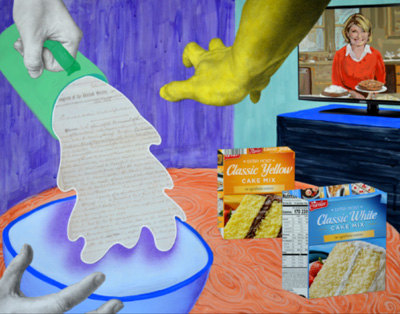- Featuring
- Theis Ørntoft
- Jonas Gardell
- Nina Yargekov
- Pedro de Jesús
- Robert Kirkbride
- Zenia Tompkins and Andrii Krasnyashchikh
Welcome to our Spring 2022 edition, released just as Russia’s invasion enters a brutal new phase. We’ve been curating a space for writers in support of Ukraine in a new weekly column at the blog. Now, we proudly bring you Andrii Krasnyashchikh’s letters from Kharkiv, Kate Tsurkan’s interview with Zenia Tompkins, and Ian Ross Singleton’s review of Words for War: New Poems from Ukraine. Complemented by guest artist Shuxian Lee’s poignant cover, these pieces and the new issue remind us that if “humans are destructive”—as frequent contributor Theis Ørntoft puts it across so powerfully in his essay “Our Days in Paradise are Over”—“we are also an organising phenomenon in the cosmos.”
An absolute highlight amid new work from thirty-four countries, Ørntoft’s essay is itself an organizing phenomenon that deserves to be dwelt on. Wolves have been said to return to Denmark, so Ørntoft takes a drive to the west of Jutland with a friend to investigate. Instead of the fabled animal, he stumbles upon an abandoned farm, which sparks off a series of ruminations that go something like this: “Everything in the universe decays,” so humans have to put in work to maintain “habitable worlds.” Civilization “began with the delineation of a garden,” but capitalism has taken it to the point where every inch of planet Earth has been altered and nature no longer exists “out there”—no wonder, then, that said expedition yields zero sightings of wolves. Heavily mythologized across cultures, wolves most often represent danger, chaos, the unknown—yet, in the author’s telling, they also stand for the primeval and, therefore, a certain elusive real, in stark contrast to the various symbolisms thrust upon them. Ørntoft then inverts the anthropocentric paradigm that humans are used to—with them at the top of the food chain, even though they do not necessarily self-identify as animals—and asks us to consider what message wolves might hold for us instead.
Apart from Nina Yargekov’s uproarious adaptation of “Little Red Riding Wolf” for the age of the #MeToo movement—the obvious story with which Ørntoft’s nonfiction might be paired—“Our Days in Paradise are Over” echoes Nobel laureate Hermann Karl Hesse’s empathetic Weltanschauung in two new translations of his poems by Wally Swist; it also asks us to pay attention to the various animals conjured in this edition: from the suffering, captive bat in Bosnian author Aljoša Ljubojević’s “How We Started the War” to the elusive boar in Pedro de Jesús’s slippery poem, in which various hunters discuss the “art of the hunt” only to miss the point; and the cats with beautiful eyes in Agnieszka Taborska’s fascinating piece on surrealists vis-à-vis their chosen suicides, “yawn[ing] and stretch[ing] in all their dignity, distance, and above all their enormous indifference to the person standing there on the chair with her head in a noose.”
I am also thrilled to give you a Swedish Feature, organized in partnership with the Swedish Arts Council, in which acclaimed poet Kristina Lugn is joined by Kristofer Folkhammar and Lina Hagelbäck—both relative newcomers whose fiery talents surely destine them for international acclaim. Fresh from winning the 2021 August Prize for a collection of essays that translator D. E. Hurford compares to Kate Brigg’s This Little Art, Nils Håkanson brings us up to speed with the state of translation criticism in Sweden (spoiler: it’s a sorry one, alas), while Jonas Gardell tells the story of a “particular time and place,” where nurses are told never to “wipe [the] tears [of patients dying from HIV complications] without gloves.” Hanna Nordenhök’s Caesaria might also be described as a very specific sort of historical fiction—narrated as it is from the point of view of a girl born via one of Sweden’s first Caesarian sections and then squirreled away by the doctor to a secluded country estate after her mother dies in childbirth. In Majgull Axelsson’s and Sara Osman’s fictions, on the other hand, outsiders—of Roma and Somali origins respectively—search for their place within contemporary Swedish society at great cost. Accompanying the Feature is novelist Lina Wolff’s generous interview on coping with the loss of a parent, writing historyless characters in the grip of a demon, and how karate cured her of one particular hang-up.
Those of you who are longtime readers may recall the multilingual projects that remain some of the magazine’s most exciting features—for reaching beyond the Anglophone community, thereby expanding other world literatures in the process: Jonas Hassen Khemiri's viral letter to Beatrice Ask (in nineteen additional languages); Pedro Novoa’s short story “The Dive” (fifteen), and Nobel laureate Herta Müller's “The Space Between Languages” (eleven), and, most memorably—because the school in Mexico we did it for heard about our endeavor and thanked us for it, and the project was even covered in the largest-circulation Mexican newspaper, as former editor-at-large Sophie Hughes reported in this blog article—David Huerta’s “Say Ayotzinapa” poem (twenty, prefaced by Valeria Luiselli). It’s been a while since we have done anything like this, both because of the logistics behind it (as it became clear that the efforts expended toward such projects might be better channeled toward sustainability) and also because texts that are as worthy of this specific sort of advocacy as they are short don't come by that often. Then, in February, Robert Kirkbride’s “The Reading Chamber”—this issue’s utterly inventive Brave New World Literature Feature—presented an opportunity. Due to external circumstances beyond our control, we have so far only been able to commission two translations. If you are a seasoned translator working in a language other than English, Italian, or Spanish, and would like to play a role in making this gem of a text available in other languages, drop us a note with the subject header “Translating The Reading Chamber.”
As usual, I’ll end my editor’s note with calls for involvement, this time bumping up the most important one. You may have heard of the Literary Arts Emergency Grants totalling US$4.3 million distributed to 313 nonprofit literary arts organizations and publishers across the United States just this past week; Asymptote, due to its international setup, was not eligible. However, we’re as affected by inflation and attrition as any other organization, thus the ads you see on your screens. Help us carry on our vital mission by signing up as a sustaining member or a masthead member from as little as US$5 a month (in fact, if three masthead members—or the equivalent thereof—sign up by June 2022, we’ll take down the pop-ups—that’s a promise from me!). Subscribing to our Book Club is a great way to take both your love for and support of world literature to the next level. If you’re interested in joining our team, good news: We are expanding—check out our mid-year recruitment call here (deadline: May 1), advertising for editors, social media whizzes, and a Book Club manager, among others. As always, we invite submissions to our regular categories on a rolling basis; if you are a translator of Armenian or Swiss literature, take note of our just-released call for two paid Special Features (deadline: June 1). Finally, don’t forget to bookmark our daily blog, follow us on Facebook, Twitter, and two Instagram feeds, and subscribe to our newsletter for exclusive content, giveaways, and the latest news.
Thank you for reading and supporting us all these years. We hope you enjoy this issue!
—Lee Yew Leong, Editor-in-Chief
Editorial Team for Issue April 2022
Editor-in-Chief: Lee Yew Leong (Taiwan/Singapore)
Assistant Managing Editors: Daljinder Johal (UK/India), Marina Martino (UK), Janet Phillips (UK/Australia), Lindsay Semel (Portugal/USA), and Michal Zechariah (USA)
Section Editors:
Lee Yew Leong (Taiwan/Singapore)
Bassam Sidiki (USA/Pakistan)
Caridad Svich (USA/UK)
Barbara Halla (Albania)
Eva Heisler (Germany/USA)
Editor of Special Feature on Swedish Literature: Lee Yew Leong (Taiwan/Singapore)
Assistant Editors: Alyea Canada (USA), Whitney DeVos (Mexico/USA), Sabrina Greene (USA), Jaedyn Hedman (USA), Shawn Hoo (Singapore), Gabriela Lemos (USA), M.L. Martin (Canada), Maya Nguen (USA), Megan Sungyoon (South Korea), Fairuza Hanun Razak (Indonesia), Alex Tan (Singapore), Laurel Taylor (Japan/USA), and Lin Chia-Wei (Taiwan)
Contributing Editors: Ellen Elias-Bursac (USA), Aamer Hussein (UK), Sim Yee Chiang (Singapore), Dylan Suher (USA), and Adrian West (USA)
Translation Tuesdays Editor: Shawn Hoo (Singapore)
Art Director: Lee Yew Leong (Taiwan/Singapore)
Director, Educational Arm: Kent Kosack (USA)
Editor-at-large, Argentina: Josefina Massot
Editor-at-large, Guatemala: José García
Editors-at-large, Hong Kong: Jacqueline Leung and Charlie Ng Chak-Kwan
Editor-at-large, Japan: David Boyd
Editor-at-large, Lebanon: MK Harb
Editor-at-large, Mexico: Alan Mendoza Sosa
Editor-at-large, Palestine: Carol Khoury
Editor-at-large, Romania and Moldova: MARGENTO
Editor-at-large, Slovakia: Julia Sherwood
Editor-at-large, Vietnam: Thuy Dinh
Masthead for Issue April 2022
Fiction, Poetry, Interview, and Special Features: Lee Yew Leong
Nonfiction: Bassam Sidiki
Drama: Caridad Svich
Criticism: Barbara Halla
Visual: Eva Heisler
Illustrations and Cover: Shuxian Lee
Assistant Managing Editor (supervising issue production): Janet Phillips
Assistant Managing Editors (supervising Assistant Editors): Lindsay Semel and Marina Martino
Assistant Managing Editors (supervising Editors-at-Large): Daljinder Johal and Michal Zechariah
Chief Executive Assistant: Rachel Farmer
Senior Executive Assistants: Angela Bulgari, Julie Shi, and Anna Thyregod Wilcks
Blog Editors: Erica Eisen, Darren Huang, and Xiao Yue Shan
Newsletter Editor: Amaryllis Gacioppo
Art Director: Lee Yew Leong
Guest Artist Liaison: Berny Tan
Senior Copy Editors: George Macbeth, Janet Phillips, and Rachel Stanyon
Copy Editors: Nadiyah Abdullatif, Andrea Blatz, Bella Bosworth, Caterina Domeneghini, Sophie Hoffman, Matilde Ribeiro, Liam Sprod, and Maggie Wang
Technical Manager: József Szabó
Director of Outreach: Georgina Fooks
Assistant Director of Outreach: Ka Man Chung
English Social Media: Ruwa Alhayek, Samantha Mateo, and Oliva Roslansky
Spanish Social Media: Sergio Serrano, Sofia Monzon, and Madeline Robinson
French Social Media: Filip Noubel
Graphic Designer: Michael Laungjessadakun
Marketing Manager: Samantha Seifert
Director, Educational Arm: Kent Kosack
Educational Arm Assistants: Katarzyna Bartoszynska, Irmak Ertuna, Mary Hillis, Thirangie Jayatilake, A.M. Ringwalt, and Anna Rumsby
Book Club Manager: Alexandra Irimia
Interns: Caterina Domeneghini and John Tinneny
Asymptote would like to acknowledge the support especially of: 
as well as Lisa Renee Kuerbis and Shogher Margossian.
For their generous donations this past quarter, our heartfelt thanks go too to Christina Kramer, Daniel Hahn, Jeffrey Boyle, Jenna Colozza, Joyce Shapiro, Katarzyna Bartoszynska, Lara Norgaard, Phuong Anh Nguyen, Lynn O'Neal, Marjolijn de Jager, Mark Cohen, Martin Ingebrigtsen, Matthew Mazowita, Mireille Pierre-Louis, Mo O'Mahony, Monty Reid, Nhi Ta Huong, Philip Feinsilver, Ryan Chartrand, Thomas Carroll, Velina Manolova, Xiangxiu Meng, and Yvonne Koh.


